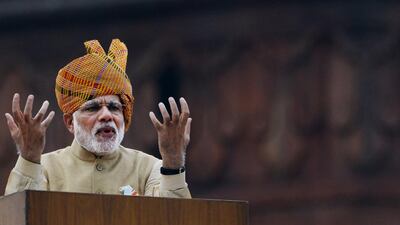NEW DELHI // Commending the rulers of the UAE for building “a paradise in the desert,” India’s prime minister Narendra Modi said he was looking forward to strengthening ties between the two countries during his two-day visit that begins on Sunday.
In an exclusive interview granted to the correspondents of UAE newspapers, Mr Modi said it was unfortunate that no Indian prime minister had visited the UAE in 34 years. “In that time, the relationships between the people of the two countries have advanced greatly of their own accord,” he said. “But the relationships between the two governments haven’t advanced as much.”
“There has been a mismatch, and I hope to correct that on this trip.”
Mr Modi, who has been an energetic traveller during his year as prime minister, having visited 25 countries since his election in May 2014, will also be making his first trip to the Arab world.
Mr Modi sat for the short interview in his residence in the Indian capital hours after he had delivered the annual Independence Day address, in which he reiterated his commitment to ending corruption and poverty in India.
After arriving in the UAE on Sunday afternoon, the Indian prime minister will visit Sheikh Zayed Grand Mosque, meet Indian workers at a labour camp and attend a dinner hosted by Hamed bin Zayed, the chief executive of the Abu Dhabi Investment Authority. He is also expected to visit Masdar City, to observe the concept of the “smart city”, a large part of his vision for India.
On Monday, Mr Modi will meet Sheikh Mohammed bin Zayed, Crown Prince of Abu Dhabi and Deputy Supreme Commander of the Armed Forces, and Sheikh Mohammed bin Rashid, the Vice President and Ruler of Dubai.
That evening, he will attend a public event at the Dubai Cricket Stadium, which is expected to be thronged by 50,000 Indians. From the stadium, he will leave directly for the airport to fly back to India.
A source in the ministry of external affairs told The National that trade, energy security and investment figure prominently on Mr Modi's agenda.
But he will also focus on reaching out to the UAE's population of 2.6 million Indians. "I not only seek to encourage them to be part of India's success, but am also taking steps, both general and specific to them, to facilitate their travel to and participation in India," Mr Modi told The National.
Indians in the UAE account for roughly US$15 billon (Dh55bn) in annual remittances to India, Mr Modi said.
Among Mr Modi’s top priorities will be to seek investment from the UAE, whose sovereign wealth fund reserves are estimated to be roughly $800bn.
The prime minister has regularly sought foreign investment in India during his trips overseas. Last week, Nirmala Sitharaman, India’s minister for commerce and industry, told parliament that India had received $19.78bn in investment from countries Mr Modi had visited.
The UAE is the 10th biggest foreign investor in India. As of January, roughly $3bn had flowed from the UAE to India in the form of foreign direct investment. Investors in the UAE hold another $5bn in portfolio investments in India.
Gauri Khandekar, deputy director of the Global Relations Forum, a Brussels-based think tank, said the UAE was India’s third biggest trading partner.
According to government figures, bilateral trade between the two countries in 2014-15 stood at roughly $60bn, down from a record high of $75.5bn in 2012-13. Last year, the UAE imported nearly $33bn in Indian merchandise.
In turn, the UAE became India’s sixth largest supplier of crude oil. India was the UAE’s largest trading partner in 2013.
“Since [the UAE] contributes about 8.5 per cent to India’s oil imports, we are keen to stitch up long-term agreements,” the ministry source said.
Mr Modi’s trip will provide an opportune moment to boost its oil trade with the UAE. Global crude oil prices hover at around $50 a barrel, much lower than last year.
From a security perspective, Kabir Taneja, a visiting scholar at the Oslo-based Fridtjof Nansen Institute, said he expected “ISIS and the prevailing situation in Iraq and Syria to feature very highly on the agenda”.
Mr Modi confirmed this, saying: “There is no alternative to a comprehensive and concerted action by all countries in the region to solve the problems in Syria and check the menace of terrorism and extremism.”
Mr Modi’s visit will help firm up ties with the Arab world, particularly at a time when India under his leadership seems to be pivoting towards Israel, Ms Khandekar said.
Like Mr Taneja, Ms Khandekar agreed that “the Middle East has been one of the most ignored regions of the world for Indian foreign policy”.
Manmohan Singh, Mr Modi’s predecessor, was expected to reciprocate the visits to India by Sheikh Mohammed bin Rashid in 2007 and 2010, but his trip never panned out.The highest-ranking Indian official to visit the UAE in recent years has been Pratibha Patil, who made a five-day state visit when she was president of India in 2010.
"One of the reasons has been that many of the previous governments, which have mostly been led by the Congress party, have always favoured relations with the West," Ms Khandekar told The National. Mr Modi's Bharatiya Janata Party won an absolute majority in parliamentary elections last year to end 10 years of Congress rule.
“Also, India is just now awakening to the necessity of enhancing its strategic presence in the region, because India’s own global role is rising, and India is becoming more acutely aware of the role it must play in the region in particular,” she said.
Mr Modi said he had always observed the UAE from afar, with great interest, as the country developed and flourished.
“I never got a chance to go there as a civilian,” he said. “But now I’m getting a chance to go there as a prime minister.”
ssubramanian@thenational.ae

